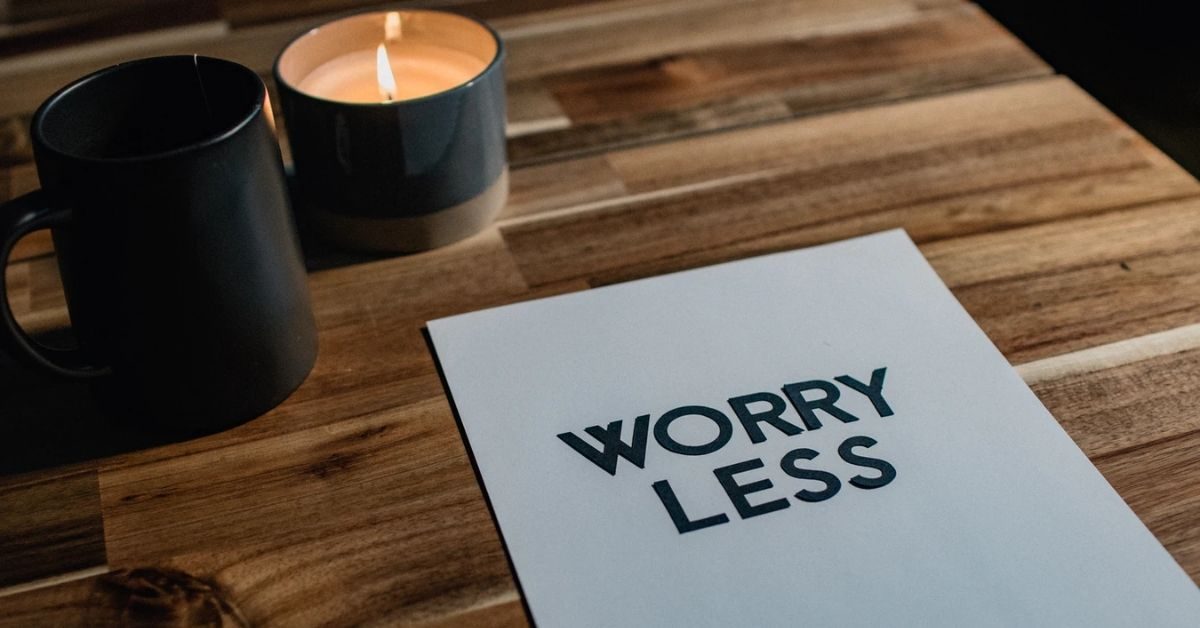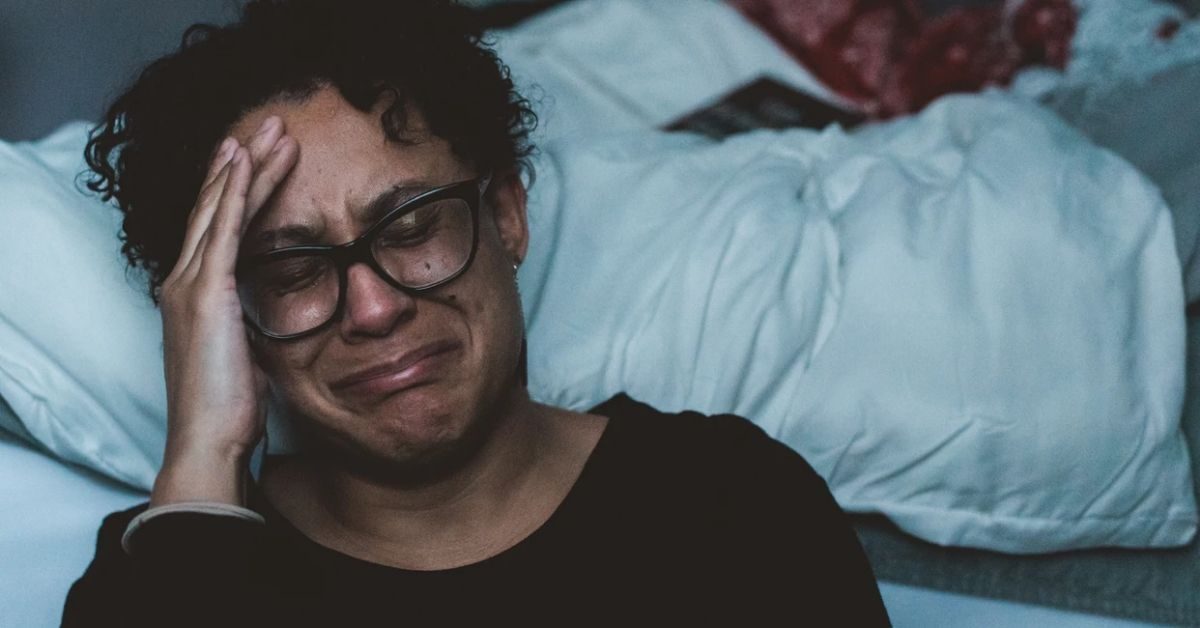Can lack of sleep cause stress? This question is likely on the tip of your tongue if you’re experiencing poor sleep and sleep deprivation and everything feels too much.
While you may lead a busy life with a fast-paced routine, sacrificing too much sleep can have detrimental effects on your mental health.
Skipping a few hours of sleep once in a blue moon may not have long-term effects, but continuously missing out on sleep will eventually take its toll.
Read on to learn how a lack of sleep results in stress and how to avoid this happening.
(Note. While we earn commission from the links in this article, we only recommend the products we truly believe will improve your sleep the most. These commissions come at no extra expense to you and help us to keep providing you with expert sleep information for free.)
Can Sleeping Help Reduce Stress?

The relationship between sleep quality and stress levels is a two-way relationship.
Any stressful situation can potentially lead to the emergence of sleep disorders such as chronic insomnia. In turn, a lack of sleep can make stress worse. Stress then reduces your quality of sleep, leading to fewer hours of sleep per night, perpetuating the cycle.
Sleep studies suggest that sleep loss not only leads to poor sleep quality but also causes emotional distress. One of the effects of sleep deprivation is selective attention to threats, which can cause acute stress and makes insomnia worse.
It is essential to get adequate sleep by managing the hours of sleep per night because going to deep sleep regularly reduces the risk of depression. According to peer-reviewed studies, lack of sleep performance levels in the daytime and interruptions in your natural sleep cycles can cause chronic stress during work or dangerous situations.
Relaxation techniques can help avoid insufficient sleep. There are plenty of relaxation techniques to sleep better and increase the hours of sleep per night.
How Can a Lack of Sleep Cause Stress? Here’s How.
Sleepless nights can lead to long-term sleep deprivation, causing stress on your mind and body.
If you’re not getting enough hours of sleep, the effects of poor sleep can pile up, affecting your mental health. Here’s how.
1. People with insomnia have high stress levels

People with insomnia tend to suffer from constant stress.
A study observing the effects of short-term insomnia and acute stress has found a bilateral relationship between stress and insomnia.
In layman’s terms, stress causes insomnia, and insomnia causes stress. People with chronic stress tend to show short-term insomnia symptoms.
The study looked into the relationship between perceived stress and insomnia symptoms using coping strategies and quality of life as covariates. In conclusion, the results support the role of reducing stress in managing symptoms of short-term insomnia.
2. Sleep deprivation increase cortisol levels
Cortisol is the stress hormone.
Sleep deprivation causes higher levels of cortisol. This causes more stress and alertness by triggering a stress response, making it harder to sleep.
Changes to your sleeping schedule, such as long-term sleep deprivation, can affect the levels of cortisol your body produces.
In other words, persistent sleep deprivation and poor sleep habits cause stress.
To reduce the chances of acute stress, you need to address sleep deprivation.
3. Lack of sleep may cause performance issues

Lack of sleep is the primary cause of daytime sleepiness, which can result in cognitive performance issues.
Excessive sleepiness results in low energy levels, interfering with daily life. Many jobs require a certain level of physical activity, so excessive sleepiness could increase the risk of injury in the workplace, especially if the employee is in a stressful situation.
Not only do performance issues caused by sleep deprivation affect your work, but any daily activities that involve any kind of physical or mental effort such as hobbies and social interactions will be affected too.
Suffice to say that daytime sleepiness poses a risk to your wellbeing but also can hinder your day-to-day life, making interactions and tasks feel more stressful.
4. Inadequate sleep can increase symptoms of anxiety

Inadequate sleep can increase symptoms of anxiety. This occurs because a lack of sleep causes low-grade inflammation in the brain, increasing the symptoms in people with anxiety or mood disorders.
Not only that, but sleep deprivation has been linked as a cause for stressful mood disorders. People with an anxiety disorder are more prone to have episodes if they have poor sleep quality.
If you want to improve your sleep quality and avoid anxiety, here’s a guide that can help you get better sleep at night.
5. Sleep deficit increases the risk of depression

Inadequate sleep has been linked to an increased risk of depression.
According to the National Sleep Foundation:
“Depression and sleep issues have a bidirectional relationship. This means that poor sleep can contribute to the development of depression and that having depression makes a person more likely to develop sleep issues. This complex relationship can make it challenging to know which came first, sleep issues or depression.”
Bad sleep and a short sleep duration can lead to depressive symptoms. This is especially prevalent among young people. The tough transition from childhood to adolescence already contributes to mental health issues, and sleep deprivation can make this worse.
There’s no downplaying the importance of making adequate time to sleep each night.
In Short
Can lack of sleep cause stress? Yes, it can.
There’s such a bilateral relationship between chronic stress and poor sleep quality that anyone who suffers from persistent symptoms of stress should keep a close eye on their sleeping schedule.
A great way to keep tabs on your sleep is with a sleep diary. That way, you can have control of your schedule, the number of hours you sleep, and even your dreams. Incorporating this into a relaxing bedtime routine should do wonders for your well-being.
If you’re worried about the effects of sleep deprivation causing you stress, join our private Sleep Tips Facebook group to get advice from like-minded people.

Welcome to Snoozerville! I’m Dr. Alex Hartley, your guide to the world of restful sleep. With a Ph.D. in Sleep Science and years of experience as a sleep therapist, I’ve dedicated my life to understanding and improving sleep quality. My passion lies in uncovering the mysteries of sleep and sharing practical, science-backed advice to help you achieve the best rest possible. Beyond my academic pursuits, I’m an advocate for mindfulness and relaxation techniques, which I incorporate into my daily routine. At Snoozerville, I aim to transform your nights, combining the latest research with easy-to-implement tips. Whether you’re a chronic insomniac or just looking to improve your sleep hygiene, join me on this journey towards peaceful, rejuvenating sleep.

